Complete Solutions to SECTION -A (Reading) of chapter QUESTION PAPER 2022 TERM 1 SET 2 of Class 12 book with complete answers and questions
| Class 12 | ENGLISH |
| Chapter | QUESTION PAPER 2022 TERM 1 SET 2 |
| XII BOARDS PREVIOUS YEAR | SECTION -A (Reading) |
| Number Of Questions | 19 |
| Academic Year | 2023-24 |
1. Humility treads the fine line between arrogance and self-deprecation. Humility, modesty and down-to-earth are synonyms derived from the Latin, 'humus', translatable as 'grounded or from the earth'. So, what makes someone humble ? Are the humble meek or psychologically weak ?
2. In today's stressful world, greatly concerned with the pursuit of happiness, a bit of humility can deliver great reserves of inner strength.
3. Gandhiji felt that humility is an essential virtue that must exist in a person for other virtues to emerge. To Swami Vivekananda, humility did not mean crawling on all fours and calling oneself a sinner. Instead, it meant recognising and feeling oneness with everyone and everything else in the universe, without inferiority or superiority or any other bias.
4. Although humility is deeply revered in most spiritual traditions, in interpersonal narrative or management lingua, it hasn't found much salience. Amongst qualities of leaders, humility finds hardly any mention, although most of the world's great leaders are themselves lessons in the art of it. Fortunately, a great deal of management and psychological research today is devoted to the role of humility in character building and leadership.
5. As workplaces tend to be aggressive arenas and breeding grounds for misogyny and other abuse, humble co-workers are valued. They put their interlocutors at ease, and it takes fear and trepidation out of social intercourse. From the interpersonal perspective, being humble facilitates trust, and builds relationships. The humble may be more talented, gifted, or skilled than anyone else and above all better learners and problem solvers. In fact, studies show that humility is more important as a predictive performance indicator than IQ. With humbleness comes a self-acceptance from grounding one's worth in one's intrinsic value as human beings rather than other trappings of power and wealth.
6. Is it possible to develop humility ? We must first embrace our humanness and have an accurate understanding of our strengths and weaknesses. Expressing gratitude can induce humility in us, and humble people have a greater capacity for conveying gratitude.
7. Holding nature in high esteem, recognising it as an overwhelming and awe-inspiring force reminds us of our own insignificance in the cosmic scale. Being curious and open to learning fosters humility. Emulating great people and imbibing from them what we lack in our own understanding can build our own reserves of humility. After all, as Socrates said, wisdom is, above all, knowing what we don't know. (360 words)
The author uses the expression treads the fine line' to mean:
View Solution1. Humility treads the fine line between arrogance and self-deprecation. Humility, modesty and down-to-earth are synonyms derived from the Latin, 'humus', translatable as 'grounded or from the earth'. So, what makes someone humble ? Are the humble meek or psychologically weak ?
2. In today's stressful world, greatly concerned with the pursuit of happiness, a bit of humility can deliver great reserves of inner strength.
3. Gandhiji felt that humility is an essential virtue that must exist in a person for other virtues to emerge. To Swami Vivekananda, humility did not mean crawling on all fours and calling oneself a sinner. Instead, it meant recognising and feeling oneness with everyone and everything else in the universe, without inferiority or superiority or any other bias.
4. Although humility is deeply revered in most spiritual traditions, in interpersonal narrative or management lingua, it hasn't found much salience. Amongst qualities of leaders, humility finds hardly any mention, although most of the world's great leaders are themselves lessons in the art of it. Fortunately, a great deal of management and psychological research today is devoted to the role of humility in character building and leadership.
5. As workplaces tend to be aggressive arenas and breeding grounds for misogyny and other abuse, humble co-workers are valued. They put their interlocutors at ease, and it takes fear and trepidation out of social intercourse. From the interpersonal perspective, being humble facilitates trust, and builds relationships. The humble may be more talented, gifted, or skilled than anyone else and above all better learners and problem solvers. In fact, studies show that humility is more important as a predictive performance indicator than IQ. With humbleness comes a self-acceptance from grounding one's worth in one's intrinsic value as human beings rather than other trappings of power and wealth.
6. Is it possible to develop humility ? We must first embrace our humanness and have an accurate understanding of our strengths and weaknesses. Expressing gratitude can induce humility in us, and humble people have a greater capacity for conveying gratitude.
7. Holding nature in high esteem, recognising it as an overwhelming and awe-inspiring force reminds us of our own insignificance in the cosmic scale. Being curious and open to learning fosters humility. Emulating great people and imbibing from them what we lack in our own understanding can build our own reserves of humility. After all, as Socrates said, wisdom is, above all, knowing what we don't know. (360 words)
The author's opinion about the ambience of the present day workplace is :
View Solution1. Humility treads the fine line between arrogance and self-deprecation. Humility, modesty and down-to-earth are synonyms derived from the Latin, 'humus', translatable as 'grounded or from the earth'. So, what makes someone humble ? Are the humble meek or psychologically weak ?
2. In today's stressful world, greatly concerned with the pursuit of happiness, a bit of humility can deliver great reserves of inner strength.
3. Gandhiji felt that humility is an essential virtue that must exist in a person for other virtues to emerge. To Swami Vivekananda, humility did not mean crawling on all fours and calling oneself a sinner. Instead, it meant recognising and feeling oneness with everyone and everything else in the universe, without inferiority or superiority or any other bias.
4. Although humility is deeply revered in most spiritual traditions, in interpersonal narrative or management lingua, it hasn't found much salience. Amongst qualities of leaders, humility finds hardly any mention, although most of the world's great leaders are themselves lessons in the art of it. Fortunately, a great deal of management and psychological research today is devoted to the role of humility in character building and leadership.
5. As workplaces tend to be aggressive arenas and breeding grounds for misogyny and other abuse, humble co-workers are valued. They put their interlocutors at ease, and it takes fear and trepidation out of social intercourse. From the interpersonal perspective, being humble facilitates trust, and builds relationships. The humble may be more talented, gifted, or skilled than anyone else and above all better learners and problem solvers. In fact, studies show that humility is more important as a predictive performance indicator than IQ. With humbleness comes a self-acceptance from grounding one's worth in one's intrinsic value as human beings rather than other trappings of power and wealth.
6. Is it possible to develop humility ? We must first embrace our humanness and have an accurate understanding of our strengths and weaknesses. Expressing gratitude can induce humility in us, and humble people have a greater capacity for conveying gratitude.
7. Holding nature in high esteem, recognising it as an overwhelming and awe-inspiring force reminds us of our own insignificance in the cosmic scale. Being curious and open to learning fosters humility. Emulating great people and imbibing from them what we lack in our own understanding can build our own reserves of humility. After all, as Socrates said, wisdom is, above all, knowing what we don't know. (360 words)
Choose one of the following quotes that aptly conveys the main idea of the passage.
View Solution1. Humility treads the fine line between arrogance and self-deprecation. Humility, modesty and down-to-earth are synonyms derived from the Latin, 'humus', translatable as 'grounded or from the earth'. So, what makes someone humble ? Are the humble meek or psychologically weak ?
2. In today's stressful world, greatly concerned with the pursuit of happiness, a bit of humility can deliver great reserves of inner strength.
3. Gandhiji felt that humility is an essential virtue that must exist in a person for other virtues to emerge. To Swami Vivekananda, humility did not mean crawling on all fours and calling oneself a sinner. Instead, it meant recognising and feeling oneness with everyone and everything else in the universe, without inferiority or superiority or any other bias.
4. Although humility is deeply revered in most spiritual traditions, in interpersonal narrative or management lingua, it hasn't found much salience. Amongst qualities of leaders, humility finds hardly any mention, although most of the world's great leaders are themselves lessons in the art of it. Fortunately, a great deal of management and psychological research today is devoted to the role of humility in character building and leadership.
5. As workplaces tend to be aggressive arenas and breeding grounds for misogyny and other abuse, humble co-workers are valued. They put their interlocutors at ease, and it takes fear and trepidation out of social intercourse. From the interpersonal perspective, being humble facilitates trust, and builds relationships. The humble may be more talented, gifted, or skilled than anyone else and above all better learners and problem solvers. In fact, studies show that humility is more important as a predictive performance indicator than IQ. With humbleness comes a self-acceptance from grounding one's worth in one's intrinsic value as human beings rather than other trappings of power and wealth.
6. Is it possible to develop humility ? We must first embrace our humanness and have an accurate understanding of our strengths and weaknesses. Expressing gratitude can induce humility in us, and humble people have a greater capacity for conveying gratitude.
7. Holding nature in high esteem, recognising it as an overwhelming and awe-inspiring force reminds us of our own insignificance in the cosmic scale. Being curious and open to learning fosters humility. Emulating great people and imbibing from them what we lack in our own understanding can build our own reserves of humility. After all, as Socrates said, wisdom is, above all, knowing what we don't know. (360 words)
According to the author, understanding and respecting nature will make one realise that:
View Solution1. Humility treads the fine line between arrogance and self-deprecation. Humility, modesty and down-to-earth are synonyms derived from the Latin, 'humus', translatable as 'grounded or from the earth'. So, what makes someone humble ? Are the humble meek or psychologically weak ?
2. In today's stressful world, greatly concerned with the pursuit of happiness, a bit of humility can deliver great reserves of inner strength.
3. Gandhiji felt that humility is an essential virtue that must exist in a person for other virtues to emerge. To Swami Vivekananda, humility did not mean crawling on all fours and calling oneself a sinner. Instead, it meant recognising and feeling oneness with everyone and everything else in the universe, without inferiority or superiority or any other bias.
4. Although humility is deeply revered in most spiritual traditions, in interpersonal narrative or management lingua, it hasn't found much salience. Amongst qualities of leaders, humility finds hardly any mention, although most of the world's great leaders are themselves lessons in the art of it. Fortunately, a great deal of management and psychological research today is devoted to the role of humility in character building and leadership.
5. As workplaces tend to be aggressive arenas and breeding grounds for misogyny and other abuse, humble co-workers are valued. They put their interlocutors at ease, and it takes fear and trepidation out of social intercourse. From the interpersonal perspective, being humble facilitates trust, and builds relationships. The humble may be more talented, gifted, or skilled than anyone else and above all better learners and problem solvers. In fact, studies show that humility is more important as a predictive performance indicator than IQ. With humbleness comes a self-acceptance from grounding one's worth in one's intrinsic value as human beings rather than other trappings of power and wealth.
6. Is it possible to develop humility ? We must first embrace our humanness and have an accurate understanding of our strengths and weaknesses. Expressing gratitude can induce humility in us, and humble people have a greater capacity for conveying gratitude.
7. Holding nature in high esteem, recognising it as an overwhelming and awe-inspiring force reminds us of our own insignificance in the cosmic scale. Being curious and open to learning fosters humility. Emulating great people and imbibing from them what we lack in our own understanding can build our own reserves of humility. After all, as Socrates said, wisdom is, above all, knowing what we don't know. (360 words)
Choose the option that lists the ways to develop humility.
(i) knowing one's strength and weakness
(ii) to be aggressive and arrogant
(iii) to have low self-esteem
(iv) to be ready to learn
(v) to possess the quality of being human
View Solution1. Humility treads the fine line between arrogance and self-deprecation. Humility, modesty and down-to-earth are synonyms derived from the Latin, 'humus', translatable as 'grounded or from the earth'. So, what makes someone humble ? Are the humble meek or psychologically weak ?
2. In today's stressful world, greatly concerned with the pursuit of happiness, a bit of humility can deliver great reserves of inner strength.
3. Gandhiji felt that humility is an essential virtue that must exist in a person for other virtues to emerge. To Swami Vivekananda, humility did not mean crawling on all fours and calling oneself a sinner. Instead, it meant recognising and feeling oneness with everyone and everything else in the universe, without inferiority or superiority or any other bias.
4. Although humility is deeply revered in most spiritual traditions, in interpersonal narrative or management lingua, it hasn't found much salience. Amongst qualities of leaders, humility finds hardly any mention, although most of the world's great leaders are themselves lessons in the art of it. Fortunately, a great deal of management and psychological research today is devoted to the role of humility in character building and leadership.
5. As workplaces tend to be aggressive arenas and breeding grounds for misogyny and other abuse, humble co-workers are valued. They put their interlocutors at ease, and it takes fear and trepidation out of social intercourse. From the interpersonal perspective, being humble facilitates trust, and builds relationships. The humble may be more talented, gifted, or skilled than anyone else and above all better learners and problem solvers. In fact, studies show that humility is more important as a predictive performance indicator than IQ. With humbleness comes a self-acceptance from grounding one's worth in one's intrinsic value as human beings rather than other trappings of power and wealth.
6. Is it possible to develop humility ? We must first embrace our humanness and have an accurate understanding of our strengths and weaknesses. Expressing gratitude can induce humility in us, and humble people have a greater capacity for conveying gratitude.
7. Holding nature in high esteem, recognising it as an overwhelming and awe-inspiring force reminds us of our own insignificance in the cosmic scale. Being curious and open to learning fosters humility. Emulating great people and imbibing from them what we lack in our own understanding can build our own reserves of humility. After all, as Socrates said, wisdom is, above all, knowing what we don't know. (360 words)
What lacuna does the writer find in the structure of management lessons ?
View Solution1. Humility treads the fine line between arrogance and self-deprecation. Humility, modesty and down-to-earth are synonyms derived from the Latin, 'humus', translatable as 'grounded or from the earth'. So, what makes someone humble ? Are the humble meek or psychologically weak ?
2. In today's stressful world, greatly concerned with the pursuit of happiness, a bit of humility can deliver great reserves of inner strength.
3. Gandhiji felt that humility is an essential virtue that must exist in a person for other virtues to emerge. To Swami Vivekananda, humility did not mean crawling on all fours and calling oneself a sinner. Instead, it meant recognising and feeling oneness with everyone and everything else in the universe, without inferiority or superiority or any other bias.
4. Although humility is deeply revered in most spiritual traditions, in interpersonal narrative or management lingua, it hasn't found much salience. Amongst qualities of leaders, humility finds hardly any mention, although most of the world's great leaders are themselves lessons in the art of it. Fortunately, a great deal of management and psychological research today is devoted to the role of humility in character building and leadership.
5. As workplaces tend to be aggressive arenas and breeding grounds for misogyny and other abuse, humble co-workers are valued. They put their interlocutors at ease, and it takes fear and trepidation out of social intercourse. From the interpersonal perspective, being humble facilitates trust, and builds relationships. The humble may be more talented, gifted, or skilled than anyone else and above all better learners and problem solvers. In fact, studies show that humility is more important as a predictive performance indicator than IQ. With humbleness comes a self-acceptance from grounding one's worth in one's intrinsic value as human beings rather than other trappings of power and wealth.
6. Is it possible to develop humility ? We must first embrace our humanness and have an accurate understanding of our strengths and weaknesses. Expressing gratitude can induce humility in us, and humble people have a greater capacity for conveying gratitude.
7. Holding nature in high esteem, recognising it as an overwhelming and awe-inspiring force reminds us of our own insignificance in the cosmic scale. Being curious and open to learning fosters humility. Emulating great people and imbibing from them what we lack in our own understanding can build our own reserves of humility. After all, as Socrates said, wisdom is, above all, knowing what we don't know. (360 words)
The author suggests to employ people who are humble because :
View Solution1. Humility treads the fine line between arrogance and self-deprecation. Humility, modesty and down-to-earth are synonyms derived from the Latin, 'humus', translatable as 'grounded or from the earth'. So, what makes someone humble ? Are the humble meek or psychologically weak ?
2. In today's stressful world, greatly concerned with the pursuit of happiness, a bit of humility can deliver great reserves of inner strength.
3. Gandhiji felt that humility is an essential virtue that must exist in a person for other virtues to emerge. To Swami Vivekananda, humility did not mean crawling on all fours and calling oneself a sinner. Instead, it meant recognising and feeling oneness with everyone and everything else in the universe, without inferiority or superiority or any other bias.
4. Although humility is deeply revered in most spiritual traditions, in interpersonal narrative or management lingua, it hasn't found much salience. Amongst qualities of leaders, humility finds hardly any mention, although most of the world's great leaders are themselves lessons in the art of it. Fortunately, a great deal of management and psychological research today is devoted to the role of humility in character building and leadership.
5. As workplaces tend to be aggressive arenas and breeding grounds for misogyny and other abuse, humble co-workers are valued. They put their interlocutors at ease, and it takes fear and trepidation out of social intercourse. From the interpersonal perspective, being humble facilitates trust, and builds relationships. The humble may be more talented, gifted, or skilled than anyone else and above all better learners and problem solvers. In fact, studies show that humility is more important as a predictive performance indicator than IQ. With humbleness comes a self-acceptance from grounding one's worth in one's intrinsic value as human beings rather than other trappings of power and wealth.
6. Is it possible to develop humility ? We must first embrace our humanness and have an accurate understanding of our strengths and weaknesses. Expressing gratitude can induce humility in us, and humble people have a greater capacity for conveying gratitude.
7. Holding nature in high esteem, recognising it as an overwhelming and awe-inspiring force reminds us of our own insignificance in the cosmic scale. Being curious and open to learning fosters humility. Emulating great people and imbibing from them what we lack in our own understanding can build our own reserves of humility. After all, as Socrates said, wisdom is, above all, knowing what we don't know. (360 words)
Choose the option that reiterates the author's claim about a recent study.
View Solution1. Humility treads the fine line between arrogance and self-deprecation. Humility, modesty and down-to-earth are synonyms derived from the Latin, 'humus', translatable as 'grounded or from the earth'. So, what makes someone humble ? Are the humble meek or psychologically weak ?
2. In today's stressful world, greatly concerned with the pursuit of happiness, a bit of humility can deliver great reserves of inner strength.
3. Gandhiji felt that humility is an essential virtue that must exist in a person for other virtues to emerge. To Swami Vivekananda, humility did not mean crawling on all fours and calling oneself a sinner. Instead, it meant recognising and feeling oneness with everyone and everything else in the universe, without inferiority or superiority or any other bias.
4. Although humility is deeply revered in most spiritual traditions, in interpersonal narrative or management lingua, it hasn't found much salience. Amongst qualities of leaders, humility finds hardly any mention, although most of the world's great leaders are themselves lessons in the art of it. Fortunately, a great deal of management and psychological research today is devoted to the role of humility in character building and leadership.
5. As workplaces tend to be aggressive arenas and breeding grounds for misogyny and other abuse, humble co-workers are valued. They put their interlocutors at ease, and it takes fear and trepidation out of social intercourse. From the interpersonal perspective, being humble facilitates trust, and builds relationships. The humble may be more talented, gifted, or skilled than anyone else and above all better learners and problem solvers. In fact, studies show that humility is more important as a predictive performance indicator than IQ. With humbleness comes a self-acceptance from grounding one's worth in one's intrinsic value as human beings rather than other trappings of power and wealth.
6. Is it possible to develop humility ? We must first embrace our humanness and have an accurate understanding of our strengths and weaknesses. Expressing gratitude can induce humility in us, and humble people have a greater capacity for conveying gratitude.
7. Holding nature in high esteem, recognising it as an overwhelming and awe-inspiring force reminds us of our own insignificance in the cosmic scale. Being curious and open to learning fosters humility. Emulating great people and imbibing from them what we lack in our own understanding can build our own reserves of humility. After all, as Socrates said, wisdom is, above all, knowing what we don't know. (360 words)
Gandhiji's view on humility is that:
View Solution1. Humility treads the fine line between arrogance and self-deprecation. Humility, modesty and down-to-earth are synonyms derived from the Latin, 'humus', translatable as 'grounded or from the earth'. So, what makes someone humble ? Are the humble meek or psychologically weak ?
2. In today's stressful world, greatly concerned with the pursuit of happiness, a bit of humility can deliver great reserves of inner strength.
3. Gandhiji felt that humility is an essential virtue that must exist in a person for other virtues to emerge. To Swami Vivekananda, humility did not mean crawling on all fours and calling oneself a sinner. Instead, it meant recognising and feeling oneness with everyone and everything else in the universe, without inferiority or superiority or any other bias.
4. Although humility is deeply revered in most spiritual traditions, in interpersonal narrative or management lingua, it hasn't found much salience. Amongst qualities of leaders, humility finds hardly any mention, although most of the world's great leaders are themselves lessons in the art of it. Fortunately, a great deal of management and psychological research today is devoted to the role of humility in character building and leadership.
5. As workplaces tend to be aggressive arenas and breeding grounds for misogyny and other abuse, humble co-workers are valued. They put their interlocutors at ease, and it takes fear and trepidation out of social intercourse. From the interpersonal perspective, being humble facilitates trust, and builds relationships. The humble may be more talented, gifted, or skilled than anyone else and above all better learners and problem solvers. In fact, studies show that humility is more important as a predictive performance indicator than IQ. With humbleness comes a self-acceptance from grounding one's worth in one's intrinsic value as human beings rather than other trappings of power and wealth.
6. Is it possible to develop humility ? We must first embrace our humanness and have an accurate understanding of our strengths and weaknesses. Expressing gratitude can induce humility in us, and humble people have a greater capacity for conveying gratitude.
7. Holding nature in high esteem, recognising it as an overwhelming and awe-inspiring force reminds us of our own insignificance in the cosmic scale. Being curious and open to learning fosters humility. Emulating great people and imbibing from them what we lack in our own understanding can build our own reserves of humility. After all, as Socrates said, wisdom is, above all, knowing what we don't know. (360 words)
By describing power and money as 'trappings, the author tries to convey that
View SolutionRead the passage given below:
1.The term Internet Addiction (IA) was first introduced in 1996 by Goldberg, who related it to substance dependence. IA can be defined as the maladaptive pattern of internet use which is time-consuming and leads to clinically significant impairment or distress. The symptoms of IA include tolerance, withdrawal, and lack of control, relapse, and a large amount of time spent online. Internet Addiction generally consists of four elements namely, excessive use, withdrawal, tolerance and negative social repercussions.
2. Considering the recent report on the addiction of internet in India, in 2018, All India Institute of Medical Sciences (AIIMS) claimed that the number of people visiting with the complaints of internet addiction has almost doubled since the launch of the facility two years ago. It is not only about the internet but is the symptomatic expression of other psychological problems such as anger, low self-esteem, isolation and depression. World Health Organisation (WHO) in June 2018 classified gaming disorder as a mental health condition, thus establishing the concern for the technology-oriented era on people. Further, as per the news, a London Hospital is also preparing to launch the first-ever internet addiction centre for young people and adults funded by the National Health Service (NHS).
3.Smartphones represent the edge of the evolution of information technology. As per the New Zoom's Global Market Report 2018, smartphone penetration in India is 28-5%, which constitutes 386,934,000 smartphone users.
4. The survey indicated the presence of addiction for 1-3% for internet (2% males and 0-6% females) and mobile phone overuse (419%-2-5% males and 1-5% females)
5. Recent researches have shown a positive correlation between internet addiction and frequent use of smartphones, indicating a higher frequency of internet-based use of smartphone applications, priority being social networking sites and gaming applications.
6. As more and more people are getting involved in the internet and are getting addicted, thus, they have adopted the practice of "Internet fasting" by deliberately spending time offline. Internet fasting can be defined as the re-evaluation of one's lifestyle to learn appropriate ways to use the internet by maintaining the distance from digital life. (350 words)
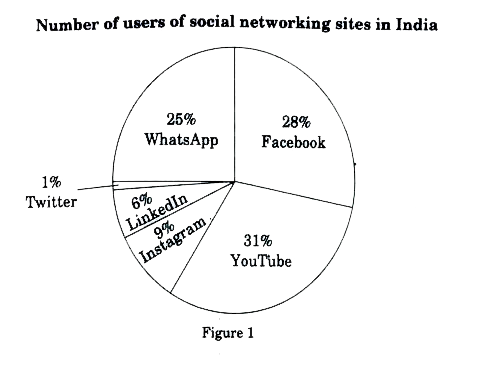
According to the author of the passage, the outcome of the advent of smartphones in the market is that:
View SolutionRead the passage given below:
1.The term Internet Addiction (IA) was first introduced in 1996 by Goldberg, who related it to substance dependence. IA can be defined as the maladaptive pattern of internet use which is time-consuming and leads to clinically significant impairment or distress. The symptoms of IA include tolerance, withdrawal, and lack of control, relapse, and a large amount of time spent online. Internet Addiction generally consists of four elements namely, excessive use, withdrawal, tolerance and negative social repercussions.
2. Considering the recent report on the addiction of internet in India, in 2018, All India Institute of Medical Sciences (AIIMS) claimed that the number of people visiting with the complaints of internet addiction has almost doubled since the launch of the facility two years ago. It is not only about the internet but is the symptomatic expression of other psychological problems such as anger, low self-esteem, isolation and depression. World Health Organisation (WHO) in June 2018 classified gaming disorder as a mental health condition, thus establishing the concern for the technology-oriented era on people. Further, as per the news, a London Hospital is also preparing to launch the first-ever internet addiction centre for young people and adults funded by the National Health Service (NHS).
3.Smartphones represent the edge of the evolution of information technology. As per the New Zoom's Global Market Report 2018, smartphone penetration in India is 28-5%, which constitutes 386,934,000 smartphone users.
4. The survey indicated the presence of addiction for 1-3% for internet (2% males and 0-6% females) and mobile phone overuse (419%-2-5% males and 1-5% females)
5. Recent researches have shown a positive correlation between internet addiction and frequent use of smartphones, indicating a higher frequency of internet-based use of smartphone applications, priority being social networking sites and gaming applications.
6. As more and more people are getting involved in the internet and are getting addicted, thus, they have adopted the practice of "Internet fasting" by deliberately spending time offline. Internet fasting can be defined as the re-evaluation of one's lifestyle to learn appropriate ways to use the internet by maintaining the distance from digital life. (350 words)
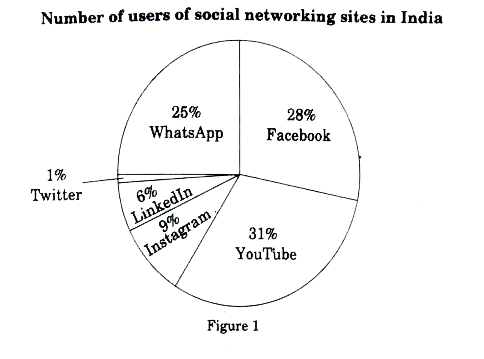
Select the correct inference with reference to the following:
AIIMS claimed that the number of people visiting with the complaints of Internet Addiction has doubled.
View SolutionRead the passage given below:
1.The term Internet Addiction (IA) was first introduced in 1996 by Goldberg, who related it to substance dependence. IA can be defined as the maladaptive pattern of internet use which is time-consuming and leads to clinically significant impairment or distress. The symptoms of IA include tolerance, withdrawal, and lack of control, relapse, and a large amount of time spent online. Internet Addiction generally consists of four elements namely, excessive use, withdrawal, tolerance and negative social repercussions.
2. Considering the recent report on the addiction of internet in India, in 2018, All India Institute of Medical Sciences (AIIMS) claimed that the number of people visiting with the complaints of internet addiction has almost doubled since the launch of the facility two years ago. It is not only about the internet but is the symptomatic expression of other psychological problems such as anger, low self-esteem, isolation and depression. World Health Organisation (WHO) in June 2018 classified gaming disorder as a mental health condition, thus establishing the concern for the technology-oriented era on people. Further, as per the news, a London Hospital is also preparing to launch the first-ever internet addiction centre for young people and adults funded by the National Health Service (NHS).
3.Smartphones represent the edge of the evolution of information technology. As per the New Zoom's Global Market Report 2018, smartphone penetration in India is 28-5%, which constitutes 386,934,000 smartphone users.
4. The survey indicated the presence of addiction for 1-3% for internet (2% males and 0-6% females) and mobile phone overuse (419%-2-5% males and 1-5% females)
5. Recent researches have shown a positive correlation between internet addiction and frequent use of smartphones, indicating a higher frequency of internet-based use of smartphone applications, priority being social networking sites and gaming applications.
6. As more and more people are getting involved in the internet and are getting addicted, thus, they have adopted the practice of "Internet fasting" by deliberately spending time offline. Internet fasting can be defined as the re-evaluation of one's lifestyle to learn appropriate ways to use the internet by maintaining the distance from digital life. (350 words)
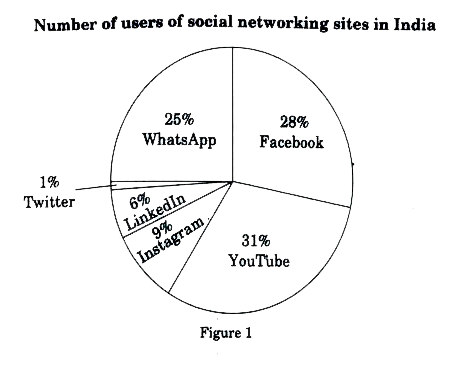
As per Paragraph 1, Internet Addiction is in a way responsible for :
View SolutionRead the passage given below:
1.The term Internet Addiction (IA) was first introduced in 1996 by Goldberg, who related it to substance dependence. IA can be defined as the maladaptive pattern of internet use which is time-consuming and leads to clinically significant impairment or distress. The symptoms of IA include tolerance, withdrawal, and lack of control, relapse, and a large amount of time spent online. Internet Addiction generally consists of four elements namely, excessive use, withdrawal, tolerance and negative social repercussions.
2. Considering the recent report on the addiction of internet in India, in 2018, All India Institute of Medical Sciences (AIIMS) claimed that the number of people visiting with the complaints of internet addiction has almost doubled since the launch of the facility two years ago. It is not only about the internet but is the symptomatic expression of other psychological problems such as anger, low self-esteem, isolation and depression. World Health Organisation (WHO) in June 2018 classified gaming disorder as a mental health condition, thus establishing the concern for the technology-oriented era on people. Further, as per the news, a London Hospital is also preparing to launch the first-ever internet addiction centre for young people and adults funded by the National Health Service (NHS).
3.Smartphones represent the edge of the evolution of information technology. As per the New Zoom's Global Market Report 2018, smartphone penetration in India is 28-5%, which constitutes 386,934,000 smartphone users.
4. The survey indicated the presence of addiction for 1-3% for internet (2% males and 0-6% females) and mobile phone overuse (419%-2-5% males and 1-5% females)
5. Recent researches have shown a positive correlation between internet addiction and frequent use of smartphones, indicating a higher frequency of internet-based use of smartphone applications, priority being social networking sites and gaming applications.
6. As more and more people are getting involved in the internet and are getting addicted, thus, they have adopted the practice of "Internet fasting" by deliberately spending time offline. Internet fasting can be defined as the re-evaluation of one's lifestyle to learn appropriate ways to use the internet by maintaining the distance from digital life. (350 words)
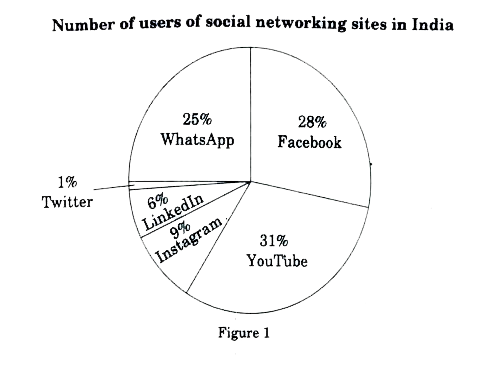
The survey mentioned in paragraph 4 establishes the fact that :
View SolutionRead the passage given below:
1.The term Internet Addiction (IA) was first introduced in 1996 by Goldberg, who related it to substance dependence. IA can be defined as the maladaptive pattern of internet use which is time-consuming and leads to clinically significant impairment or distress. The symptoms of IA include tolerance, withdrawal, and lack of control, relapse, and a large amount of time spent online. Internet Addiction generally consists of four elements namely, excessive use, withdrawal, tolerance and negative social repercussions.
2. Considering the recent report on the addiction of internet in India, in 2018, All India Institute of Medical Sciences (AIIMS) claimed that the number of people visiting with the complaints of internet addiction has almost doubled since the launch of the facility two years ago. It is not only about the internet but is the symptomatic expression of other psychological problems such as anger, low self-esteem, isolation and depression. World Health Organisation (WHO) in June 2018 classified gaming disorder as a mental health condition, thus establishing the concern for the technology-oriented era on people. Further, as per the news, a London Hospital is also preparing to launch the first-ever internet addiction centre for young people and adults funded by the National Health Service (NHS).
3.Smartphones represent the edge of the evolution of information technology. As per the New Zoom's Global Market Report 2018, smartphone penetration in India is 28-5%, which constitutes 386,934,000 smartphone users.
4. The survey indicated the presence of addiction for 1-3% for internet (2% males and 0-6% females) and mobile phone overuse (419%-2-5% males and 1-5% females)
5. Recent researches have shown a positive correlation between internet addiction and frequent use of smartphones, indicating a higher frequency of internet-based use of smartphone applications, priority being social networking sites and gaming applications.
6. As more and more people are getting involved in the internet and are getting addicted, thus, they have adopted the practice of "Internet fasting" by deliberately spending time offline. Internet fasting can be defined as the re-evaluation of one's lifestyle to learn appropriate ways to use the internet by maintaining the distance from digital life. (350 words)
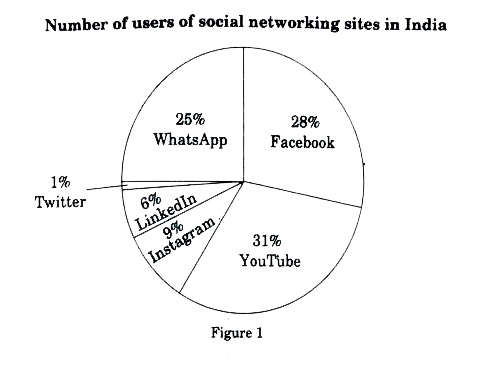
The concluding paragraph conveys the message that
View SolutionRead the passage given below:
1.The term Internet Addiction (IA) was first introduced in 1996 by Goldberg, who related it to substance dependence. IA can be defined as the maladaptive pattern of internet use which is time-consuming and leads to clinically significant impairment or distress. The symptoms of IA include tolerance, withdrawal, and lack of control, relapse, and a large amount of time spent online. Internet Addiction generally consists of four elements namely, excessive use, withdrawal, tolerance and negative social repercussions.
2. Considering the recent report on the addiction of internet in India, in 2018, All India Institute of Medical Sciences (AIIMS) claimed that the number of people visiting with the complaints of internet addiction has almost doubled since the launch of the facility two years ago. It is not only about the internet but is the symptomatic expression of other psychological problems such as anger, low self-esteem, isolation and depression. World Health Organisation (WHO) in June 2018 classified gaming disorder as a mental health condition, thus establishing the concern for the technology-oriented era on people. Further, as per the news, a London Hospital is also preparing to launch the first-ever internet addiction centre for young people and adults funded by the National Health Service (NHS).
3.Smartphones represent the edge of the evolution of information technology. As per the New Zoom's Global Market Report 2018, smartphone penetration in India is 28-5%, which constitutes 386,934,000 smartphone users.
4. The survey indicated the presence of addiction for 1-3% for internet (2% males and 0-6% females) and mobile phone overuse (419%-2-5% males and 1-5% females)
5. Recent researches have shown a positive correlation between internet addiction and frequent use of smartphones, indicating a higher frequency of internet-based use of smartphone applications, priority being social networking sites and gaming applications.
6. As more and more people are getting involved in the internet and are getting addicted, thus, they have adopted the practice of "Internet fasting" by deliberately spending time offline. Internet fasting can be defined as the re-evaluation of one's lifestyle to learn appropriate ways to use the internet by maintaining the distance from digital life. (350 words)
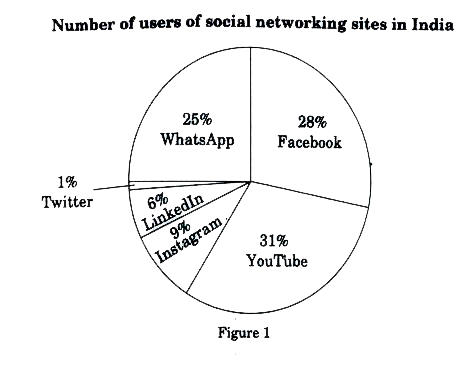
WHO in June 2018 classified gaming disorder as a mental health condition.
The above statement indicates that :
View SolutionRead the passage given below:
1.The term Internet Addiction (IA) was first introduced in 1996 by Goldberg, who related it to substance dependence. IA can be defined as the maladaptive pattern of internet use which is time-consuming and leads to clinically significant impairment or distress. The symptoms of IA include tolerance, withdrawal, and lack of control, relapse, and a large amount of time spent online. Internet Addiction generally consists of four elements namely, excessive use, withdrawal, tolerance and negative social repercussions.
2. Considering the recent report on the addiction of internet in India, in 2018, All India Institute of Medical Sciences (AIIMS) claimed that the number of people visiting with the complaints of internet addiction has almost doubled since the launch of the facility two years ago. It is not only about the internet but is the symptomatic expression of other psychological problems such as anger, low self-esteem, isolation and depression. World Health Organisation (WHO) in June 2018 classified gaming disorder as a mental health condition, thus establishing the concern for the technology-oriented era on people. Further, as per the news, a London Hospital is also preparing to launch the first-ever internet addiction centre for young people and adults funded by the National Health Service (NHS).
3.Smartphones represent the edge of the evolution of information technology. As per the New Zoom's Global Market Report 2018, smartphone penetration in India is 28-5%, which constitutes 386,934,000 smartphone users.
4. The survey indicated the presence of addiction for 1-3% for internet (2% males and 0-6% females) and mobile phone overuse (419%-2-5% males and 1-5% females)
5. Recent researches have shown a positive correlation between internet addiction and frequent use of smartphones, indicating a higher frequency of internet-based use of smartphone applications, priority being social networking sites and gaming applications.
6. As more and more people are getting involved in the internet and are getting addicted, thus, they have adopted the practice of "Internet fasting" by deliberately spending time offline. Internet fasting can be defined as the re-evaluation of one's lifestyle to learn appropriate ways to use the internet by maintaining the distance from digital life. (350 words)
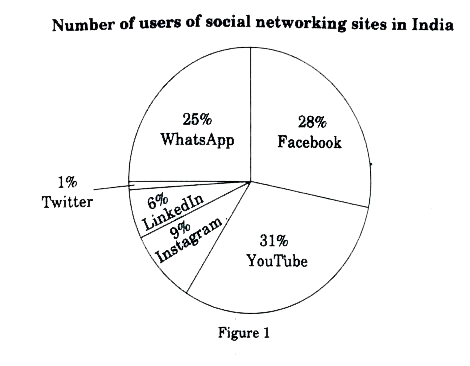
Select the option that holds true as per Figure 1:
View SolutionRead the passage given below:
1.The term Internet Addiction (IA) was first introduced in 1996 by Goldberg, who related it to substance dependence. IA can be defined as the maladaptive pattern of internet use which is time-consuming and leads to clinically significant impairment or distress. The symptoms of IA include tolerance, withdrawal, and lack of control, relapse, and a large amount of time spent online. Internet Addiction generally consists of four elements namely, excessive use, withdrawal, tolerance and negative social repercussions.
2. Considering the recent report on the addiction of internet in India, in 2018, All India Institute of Medical Sciences (AIIMS) claimed that the number of people visiting with the complaints of internet addiction has almost doubled since the launch of the facility two years ago. It is not only about the internet but is the symptomatic expression of other psychological problems such as anger, low self-esteem, isolation and depression. World Health Organisation (WHO) in June 2018 classified gaming disorder as a mental health condition, thus establishing the concern for the technology-oriented era on people. Further, as per the news, a London Hospital is also preparing to launch the first-ever internet addiction centre for young people and adults funded by the National Health Service (NHS).
3.Smartphones represent the edge of the evolution of information technology. As per the New Zoom's Global Market Report 2018, smartphone penetration in India is 28-5%, which constitutes 386,934,000 smartphone users.
4. The survey indicated the presence of addiction for 1-3% for internet (2% males and 0-6% females) and mobile phone overuse (419%-2-5% males and 1-5% females)
5. Recent researches have shown a positive correlation between internet addiction and frequent use of smartphones, indicating a higher frequency of internet-based use of smartphone applications, priority being social networking sites and gaming applications.
6. As more and more people are getting involved in the internet and are getting addicted, thus, they have adopted the practice of "Internet fasting" by deliberately spending time offline. Internet fasting can be defined as the re-evaluation of one's lifestyle to learn appropriate ways to use the internet by maintaining the distance from digital life. (350 words)
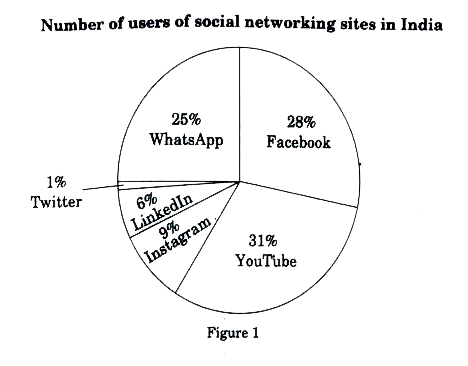
The term maladaptive in paragraph 1 refers to:
View SolutionRead the passage given below:
1.The term Internet Addiction (IA) was first introduced in 1996 by Goldberg, who related it to substance dependence. IA can be defined as the maladaptive pattern of internet use which is time-consuming and leads to clinically significant impairment or distress. The symptoms of IA include tolerance, withdrawal, and lack of control, relapse, and a large amount of time spent online. Internet Addiction generally consists of four elements namely, excessive use, withdrawal, tolerance and negative social repercussions.
2. Considering the recent report on the addiction of internet in India, in 2018, All India Institute of Medical Sciences (AIIMS) claimed that the number of people visiting with the complaints of internet addiction has almost doubled since the launch of the facility two years ago. It is not only about the internet but is the symptomatic expression of other psychological problems such as anger, low self-esteem, isolation and depression. World Health Organisation (WHO) in June 2018 classified gaming disorder as a mental health condition, thus establishing the concern for the technology-oriented era on people. Further, as per the news, a London Hospital is also preparing to launch the first-ever internet addiction centre for young people and adults funded by the National Health Service (NHS).
3.Smartphones represent the edge of the evolution of information technology. As per the New Zoom's Global Market Report 2018, smartphone penetration in India is 28-5%, which constitutes 386,934,000 smartphone users.
4. The survey indicated the presence of addiction for 1-3% for internet (2% males and 0-6% females) and mobile phone overuse (419%-2-5% males and 1-5% females)
5. Recent researches have shown a positive correlation between internet addiction and frequent use of smartphones, indicating a higher frequency of internet-based use of smartphone applications, priority being social networking sites and gaming applications.
6. As more and more people are getting involved in the internet and are getting addicted, thus, they have adopted the practice of "Internet fasting" by deliberately spending time offline. Internet fasting can be defined as the re-evaluation of one's lifestyle to learn appropriate ways to use the internet by maintaining the distance from digital life. (350 words)
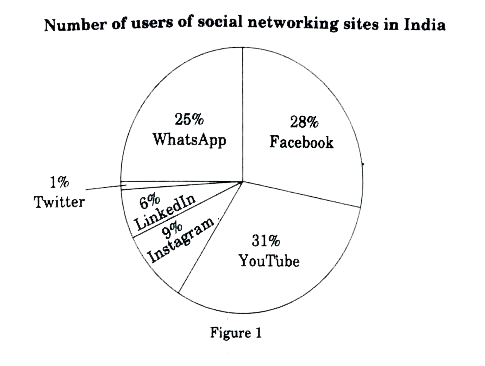
Read the following statements:
(i) Social networking sites and gaming applications are the root cause of Internet Addiction.
(ii) Internet Addiction can save people from many psychological problems.
View Solution
SECTION -A (Reading) questions and complete solutions for chapter QUESTION PAPER 2022 TERM 1 SET 2 of XII BOARDS PREVIOUS YEAR of Class 12